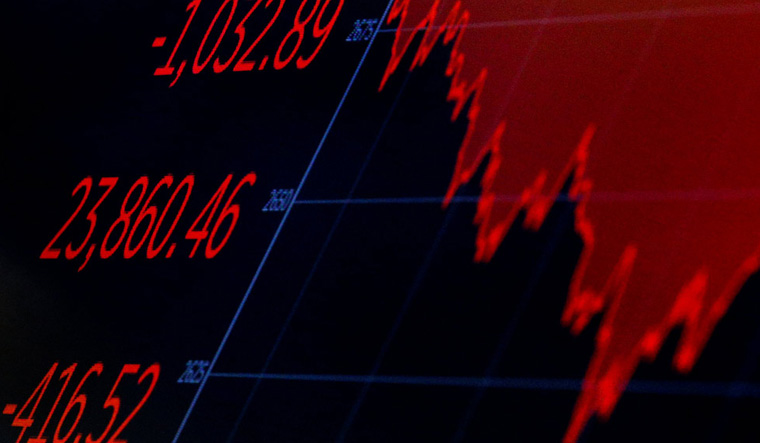Stocks ended lower on Friday, their seventh decline in eight sessions, as investors sold metal stocks worried over tariffs imposed by US President Donald Trump on steel and aluminium, which has raised concerns of a global trade war. Continued selling pressure in banking stocks also weighed.
The BSE Sensex closed 44 points or 0.13 per cent lower at 33,307.14 points and the wider NSE Nifty50 index slipped 16 points or 0.15 per cent to end at 10,226.85 points. For the week, the Sensex and Nifty declined 2.2 per cent.
Metal stocks were particularly under pressure on Friday amid concerns over the possible impact of sanctions imposed by Trump – 25 per cent tax on steel imports and 10 per cent on aluminium. Steel Authority of India (SAIL) tumbled 6.4 per cent, Jindal Steel & Power slipped 5.2 per cent and Tata Steel fell 4.7 per cent. Hindalco, Vedanta, NMDC and National Aluminium Co (NALCO) also declined 1-2 per cent.
“The protectionist measure that the USA signed in the name of employment generation and national security has raised concerns over global trade disruptions and the consequent impact on global growth,” said analysts at CARE Ratings.
It must be noted that India has had a trade surplus with the US and aluminium and steel accounted for only 3 per cent of India's exports to the US.
While, India's trade surplus is expected to continue, “the exports of steel and aluminium to USA could see moderation if the buyers there shift to buying from local producers,” added the CARE analysts.
Banking stocks remained under pressure in the wake of the widening investigation in the alleged fraud at Punjab National Bank. Earlier this week, senior officials of ICICI Bank, the country's largest private sector lender and rival Axis Bank were summoned by the Serious Fraud Investigation Office in connection with the fraud, in which billionaire jeweller Nirav Modi and his uncle Mehul Choksi are the key accused.
The finance ministry informed the Parliament on Friday that for the year-ended March 2017, state-owned banks lost Rs 19,533 crore in 2,718 cases of fraud, which will only dampen investors sentiments towards the sector further.
Axis Bank fell 2.9 per cent, Bank of Baroda declined 2.1 per cent and ICICI Bank, Yes Bank and State Bank of India were down around 1.4 per cent. Punjab National Bank also declined 1.2 per cent.
Foreign portfolio investors have been net sellers in India's equity markets since February as expectations of faster interest rate hikes in the US grow. After selling equity worth Rs 11,037 crore in February, FIIs have further sold Rs 334 crore worth equity so far in March. However, the continued domestic retail flows have cushioned the fall.
According to data released by the Association of Mutual Funds of India, equity and equity linked mutual funds saw net inflows of over Rs 16,000 crore in February, taking the total net inflows for the fiscal year-ending March 31, 2018 to over Rs 1.64 lakh crore. The inflows have continued even after Finance Minister Arun Jaitley announced a 10 per cent tax on long-term capital gains on stocks in the Budget this year.
Globally on Friday, leading Asian markets like Japan's Nikkei, Hong Kong's Hang Seng and Korea's Kospi ended higher after Donald Trump accepted North Korean leader Kim Jong Un's invitation to meet, which is a sharp contrast to the war of words between the two leaders over past several months. In the near-term, these developments could ease tensions on the Korean peninsula.
Across Europe, stock markets were trading flat to negative.
Looking ahead in the near-term, domestic equity markets may trade in a band, although further correction can't be ruled out.
“Given the headwinds (elevated market volatility, FPI equity outflows, stretched valuation, hardening bond yields, deteriorating trade balance and fiscal policy environment) are outweighing the tailwinds (strong domestic flows, economic growth and improving earnings growth), we expect the equity markets to be range-bound in the short term with a negative bias,” said analysts at Citadelle Asset Advisors.
Further correction could be used by investors as an opportunity to increase allocations to equities with a medium to long-term horizon, the analysts add.


